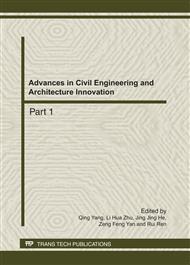p.1463
p.1469
p.1473
p.1477
p.1482
p.1487
p.1491
p.1495
p.1500
Stability of No 7 Landslide Located at Ciha Gorge under the Condition of Reservoir Water Level Rise
Abstract:
Engineering geology characteristics of No. 7 landslide located at Ciha Gorge is described and shear strength of the slip band soils is determined. Based on the above, unbalanced pushing force method is used to calculate the stability factor of the landslide the under different work conditions. It shows that the influence of the reservoir water level rising on the No. 7 landslide mainly includes two points: (1) water makes the shear strength of slip band soils reduced and thus result in the reduction of the stability factor; (2) the rising of reservoir water level also exerts water pressure to the surface of landslide body, and this is beneficial to landslide stability. Calculation results show that with the rising of reservoir water level the stability factor will experience beginning’s reducing followed by later increasing. The minimum stability factor in the process of impounding is 1.05 and it will be 1.08 when reservoir water level reaches to normal impounded level. This shows that No. 7 landslide will maintain elemental stability status in the all process of impounding.
Info:
Periodical:
Pages:
1482-1486
Citation:
Online since:
October 2011
Authors:
Keywords:
Price:
Сopyright:
© 2012 Trans Tech Publications Ltd. All Rights Reserved
Share:
Citation:


